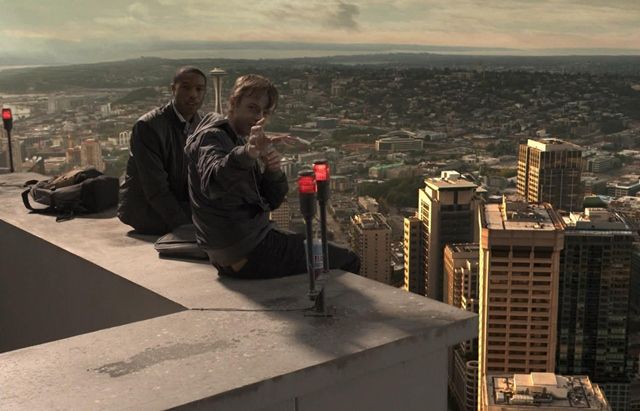
Chronicle

 Yesterday I had the pleasure of watching the first found footage film that was actually good. Found footage is a style of film making where the majority of the movie is presented through clips from the protagonist’s own camcorder, or someone close to the protagonist. It was done in Blair Witch which people tell me gave them motion sickness, and in Cloverfield which made me sick both from dizziness and from the shameless shock-and-awe tactics.
Yesterday I had the pleasure of watching the first found footage film that was actually good. Found footage is a style of film making where the majority of the movie is presented through clips from the protagonist’s own camcorder, or someone close to the protagonist. It was done in Blair Witch which people tell me gave them motion sickness, and in Cloverfield which made me sick both from dizziness and from the shameless shock-and-awe tactics.
Rather than using the found footage style as a gimmick to try and tug on the audience’s heartstrings or to create tension by waving the camera around chaotically, Chronicle’s use of found footage is integral to the story. It uses it cleverly and demonstrates that this style is not relegated to cheap horror movies.
Chronicle tells the story of three teenagers who begin to develop telekinesis. The main character, Andrew, is the most troubled of the three and films everything as a barrier to distance himself from harsh reality. He is bullied at school, abused by his father and generally friendless until his new found powers develop.
He begins using his telekinesis to float the camera around, which is a convenient and clever way for the camera to be steadied. I hate it how found footage movies simulate reality by shaking the camera so much you think you’re in a hurricane. Yes, artsy filmmaker, you’re right–if someone were in this situation, they probably would shake the camera so much that the image is indiscernible. Does that mean it’s fun or enjoyable to watch? No.*cough* Cloverfield.
Right from the start of the movie people look at the camera oddly, and tell Andrew that it’s weird. Andrew’s isolation from society and alienation is underscored by the way the story is told, which, simply put, is good storytelling.
Found footage aspects aside, the movie was fantastic. It’s a completely different take on the superhero theme, and stands out in several regards.
Number one: they mess around with their powers a great deal before doing anything else. This is a very realistic and plausible reaction for a teenager to have. Also, the uses of their powers are fairly unconventional. They are practical and have a sense of realism that no other superhero movie has done well. A teenager would use telekinesis to pop pringles into his mouth.
Number two: Andrew’s growing bond with his friends is very believable, and what is supposed to be the pinnacle of his life–becoming popular in high school–is the beginning of his downfall. After doing a fantastically impressive talent show moonlighting his telekinesis for magic tricks, Andrew goes to his first house party, gets totally wasted, and ends up alone with a girl. The other characters are incredibly proud of him, and say that, “Things are going to get better now.” As though you need to puke in a few strangers’ toilets before you’re a normal, healthy human being.
Dispelling this myth in a very harsh way, Andrew spirals downward. Because we see the forces from without putting pressure on him, we sympathize with him. We don’t see him as a villain as he becomes one. We don’t hate him–we hope for his salvation. When his father goes in to blame him one final time for the death of his mother, and all the other troubles in his life, we honestly want Andrew to drop the bastard out of the window.
That’s where this movie stands out yet again. Number three: The “villain”, if there is one, is not someone we hate. The lines between good and evil, right and wrong, are blurry and Andrew’s cousin Matt pleads with him to stop numerous times as they fight in the final battle. The emotional tension and the gritty realism of that confrontation were incredible (and not done with an annoyingly shaky camera).
After Matt stops Andrew, he turns on the camera to send a message to his cousin, because the camera has become the lens through which Andrew sees the world. “You’re not a bad person, Andrew. I know that, and that’s all that matters.” It is a beautiful way of hammering home the message that there are no such things as good people or bad people–just people doing the best they can in the circumstances they’re under. What makes Chronicle a powerful movie is not that Andrew is grotesque or Matt remarkable–it’s the fact that they’re not. And that is more terrifying than a demi-god Magneto or a galaxy-swallowing monstrosity.
My hat goes way off to the makers of this movie. We sorely need more realistic portrayals of good and evil in order to demonstrate that you don’t need to be branded with a Decepticon tattoo to be capable of evil, or wear an “S” on your chest in order to be super.
